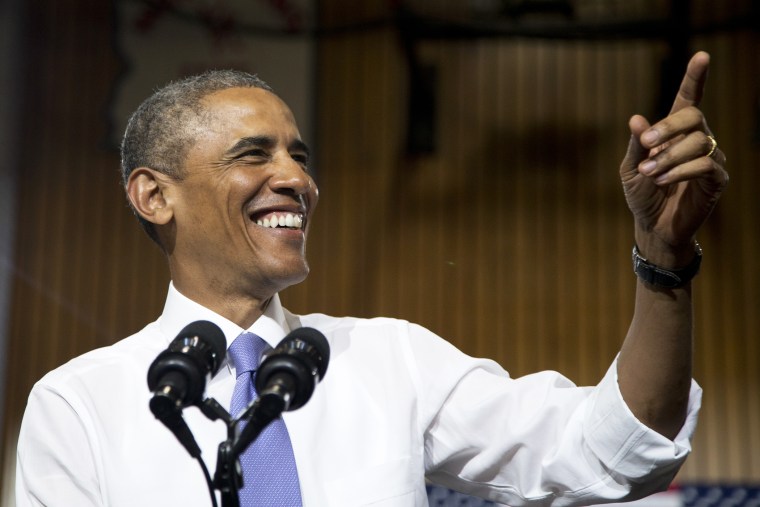About a month ago, when congressional Republicans were considering a government-shutdown scheme, Rush Limbaugh said GOP lawmakers were worried without cause.
"The Democrats have been shellacked in two recent elections, and the Republicans are running around like a fool saying the American people are not going to like them if they shut down the government is absurd," Limbaugh said. "Barack Obama's approval is in the 30s."
Last week, Christopher Caldwell, in an unfortunate piece on President Obama's legacy, said the president's support has reached "
Nixonian lows."
It's time for these assumptions about the president's political standing to be reevaluated.
A
CBS News poll released this week showed Obama's approval rating at 46%, up seven points since the last CBS poll in October. The latest
Pew survey pointed to similar results: Obama's approval is up five points to 47%. The
broader context looks good for the White House:
President Obama took a drubbing in the November elections and is the subject of constant attacks by the new Republican majority in Congress, which has taken issue with his recent executive action on immigration. But Americans appear to be gaining confidence in the president as he enters his seventh year on the job. [...] The jump coincided with a drop of four percentage points, to 40 percent, among those saying they approved of congressional Republicans' "policies and plans for the future."
This comes on the heels of similar positive Obama polling from
CNN and Gallup. All told, Obama's support is similar to where Reagan's was at this point in his second term.
At a certain level, the practical effects of the president's improved standing are quite limited. Even if they continue to improve -- a big "if" -- Obama will never be on the ballot again and the midterms are already over. What's more, the president's approval rating could soar to 90% and congressional Republicans still wouldn't consider working with him.
But the polls are important for reasons that go beyond just Obama.
The economy is not the top priority for Americans heading into 2015, the Pew Research Center reported Thursday, the first time that another issue has been at the top of the public mind under President Barack Obama. Terrorism has eclipsed the economy as the biggest issue for Americans, the group's annual survey of the public's policy priorities found, being named by 76 percent of Americans as a top priority for Obama and Congress. The economy was pegged by 75 percent -- which is still a big number, but it represented a 11-point drop from 2013. Likewise, the job situation was picked by 67 percent, the third priority behind the economy and terrorism, but it has also fallen by 12 points in the last two years.
What's more, it's worth appreciating the fact that Republicans assumed that Obama's support would deteriorate if he ignored the election results and advanced his progressive agenda. The opposite has happened -- the more the president has gotten stuff done since early November, the more his approval rating has climbed.
And while Obama's name will never appear on another ballot, the stronger the president's standing, the harder it is for Republicans to run on a platform touting dramatic change in 2016.
Of course, all of this may be temporary -- the president's standing has fluctuated a bit over the years, and there's no guarantee is improved numbers will last -- but at least for now, the "approval is in the 30s" chatter should probably end.
